Product Description
Trailer Part Trailer SWS Type Axle Thailand Type Axle
Introduction of enterprise:
HangZhou Jinlibo Trade Co.,Ltd.has introduced sophisticated equipment from overseas to develop and manufacture semi-trailer axles and related parts.Holding ISO9001:2000 certification for our management system,we faithfully follow the stipulations of this standard so as to guarantee high product quality.
Characteristics:
1.Special heat-treat,low-alloy steel axle beam,it has the vitues of good synthetic performance,strong load ability and lower self weight.
2.High quality alloy solid inserted spindle,through wholy heat treatment,provide superior fatigue capability.
3.High performance premium non-asbestos brake linings,estend serbice life.
4.Easy for ABS installation.
5.Camshaft,matching with special seals,can ensure no entry of the grease into the brake drum,more safety.
6.New tight fit hub cap habe O rings,high property for sealing.
7.Grease lubricant is supplied by Mobil that lengthens the time of free maintenance.
8.Full range of stud fixing such as ISO,BSF and JAP,it can meet the requirements of various wheel rims.
Scope of our business
1.axles (German type axle,English type axle,American type axle,Spoke axle,ZM axle,Agriculture axle,Half axle,Axle without brake)
2.Suspension (Bogie suspension,One point suspension,Rigid suspension,Spoke suspension,Machinery suspension)
3.Landing gear
4.Fifth wheel (2” 3.5”)
5.King pin (2” 3.5”)
6.Semi trailer
7.Other axles and related parts (Low bed axle,hub,rims,spring,drum…)
Products discreption:
WE CAN PRODUCE AS YOUR REQUESTS!
| Thailand type axle specifications | ||||||||||||||||
| AXLE TYPE | BRAKE SIZE | WHEEL FIXIN | NO.XSIZE OF WHEEL STUD (DIM A) | WHEEL REG.DIA. (DIM B) | DIM D | BEARING | WHEEL RIM SIZE | BEAM SIZE | TRACK LENGTH (DIM C) | AXLE CAPACITY | SPRING SEAT INSTALLATIONE | |||||
| SWS1318J | 420*180 | JAP | 8XM20X285 | 221 | 722.5 | 32216 32218 | 20″ | SQUARE150 | 1850mm | 13T | ≤450 | |||||
| SWS1318I | 420*180 | ISO | 10XM22X335 | 281 | 722.5 | 32216 32218 |
20″ | SQUARE150 | 1850mm | 13T | ≤450 | |||||
| SWS2571I | 420*220 | ISO | 10XM22X335 | 281 | 722.5 | 32220 32218 | 20″ | SQUARE150 | 1850mm | 20T | ||||||
Packing:
1.in bulk or as request
2.usually 1 20 feet contaiber can load 58 sets axles
/* March 10, 2571 17:59:20 */!function(){function s(e,r){var a,o={};try{e&&e.split(“,”).forEach(function(e,t){e&&(a=e.match(/(.*?):(.*)$/))&&1
| Condition: | New |
|---|---|
| Axle Number: | 1 |
| Application: | Trailer |
| Certification: | ISO |
| Material: | Steel |
| Type: | Semi-Trailer Axle |
| Customization: |
Available
| Customized Request |
|---|
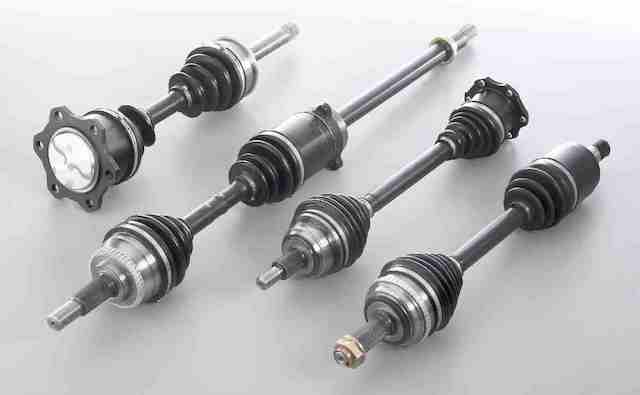
What are the key differences between live axles and dead axles in vehicle design?
In vehicle design, live axles and dead axles are two different types of axle configurations with distinct characteristics and functions. Here’s a detailed explanation of the key differences between live axles and dead axles:
Live Axles:
A live axle, also known as a solid axle or beam axle, is a type of axle where the wheels on both ends of the axle are connected and rotate together as a single unit. Here are the key features and characteristics of live axles:
- Connected Wheel Movement: In a live axle configuration, the wheels on both ends of the axle are linked together, meaning that any movement or forces applied to one wheel will directly affect the other wheel. This connection provides equal power distribution and torque to both wheels, making it suitable for off-road and heavy-duty applications where maximum traction is required.
- Simple Design: Live axles have a relatively simple design, consisting of a solid beam that connects the wheels. This simplicity makes them durable and capable of withstanding heavy loads and rough terrains.
- Weight and Cost: Live axles tend to be heavier and bulkier compared to other axle configurations, which can impact the overall weight and fuel efficiency of the vehicle. Additionally, the manufacturing and maintenance costs of live axles can be lower due to their simpler design.
- Suspension: In most cases, live axles are used in conjunction with leaf spring or coil spring suspensions. The axle is typically mounted to the vehicle’s chassis using leaf springs or control arms, allowing the axle to move vertically to absorb bumps and provide a smoother ride.
- Off-road Capability: Live axles are commonly used in off-road vehicles, trucks, and heavy-duty applications due to their robustness, durability, and ability to deliver power to both wheels simultaneously, enhancing traction and off-road performance.
Dead Axles:
A dead axle, also known as a dummy axle or non-driven axle, is a type of axle that does not transmit power to the wheels. It is primarily used to provide support and stability to the vehicle. Here are the key features and characteristics of dead axles:
- Independent Wheel Movement: In a dead axle configuration, each wheel operates independently, meaning that the movement or forces applied to one wheel will not affect the other wheel. Each wheel is responsible for its own power delivery and traction.
- Weight Distribution: Dead axles are often used to distribute the weight of the vehicle more evenly, especially in cases where heavy loads need to be carried. By adding an extra axle without driving capability, the weight can be distributed over a larger area, reducing the load on other axles and improving stability.
- Steering: Dead axles are commonly used as front axles in vehicles with rear-wheel drive configurations. They provide support for the front wheels and allow for steering control. The steering is typically achieved through a separate mechanism, such as a steering linkage or a steering gear.
- Reduced Complexity: Dead axles are simpler in design compared to live axles since they do not have the additional components required for power transmission. This simplicity can lead to lower manufacturing and maintenance costs.
- Efficiency and Maneuverability: Dead axles are often used in vehicles where power delivery to all wheels is not necessary, such as trailers, certain types of buses, and some light-duty vehicles. By eliminating the power transmission components, these vehicles can achieve better fuel efficiency and improved maneuverability.
It’s important to note that the choice between live axles and dead axles depends on the specific application, vehicle type, and desired performance characteristics. Vehicle manufacturers consider factors such as load capacity, traction requirements, off-road capability, cost, and fuel efficiency when determining the appropriate axle configuration for a particular vehicle model.
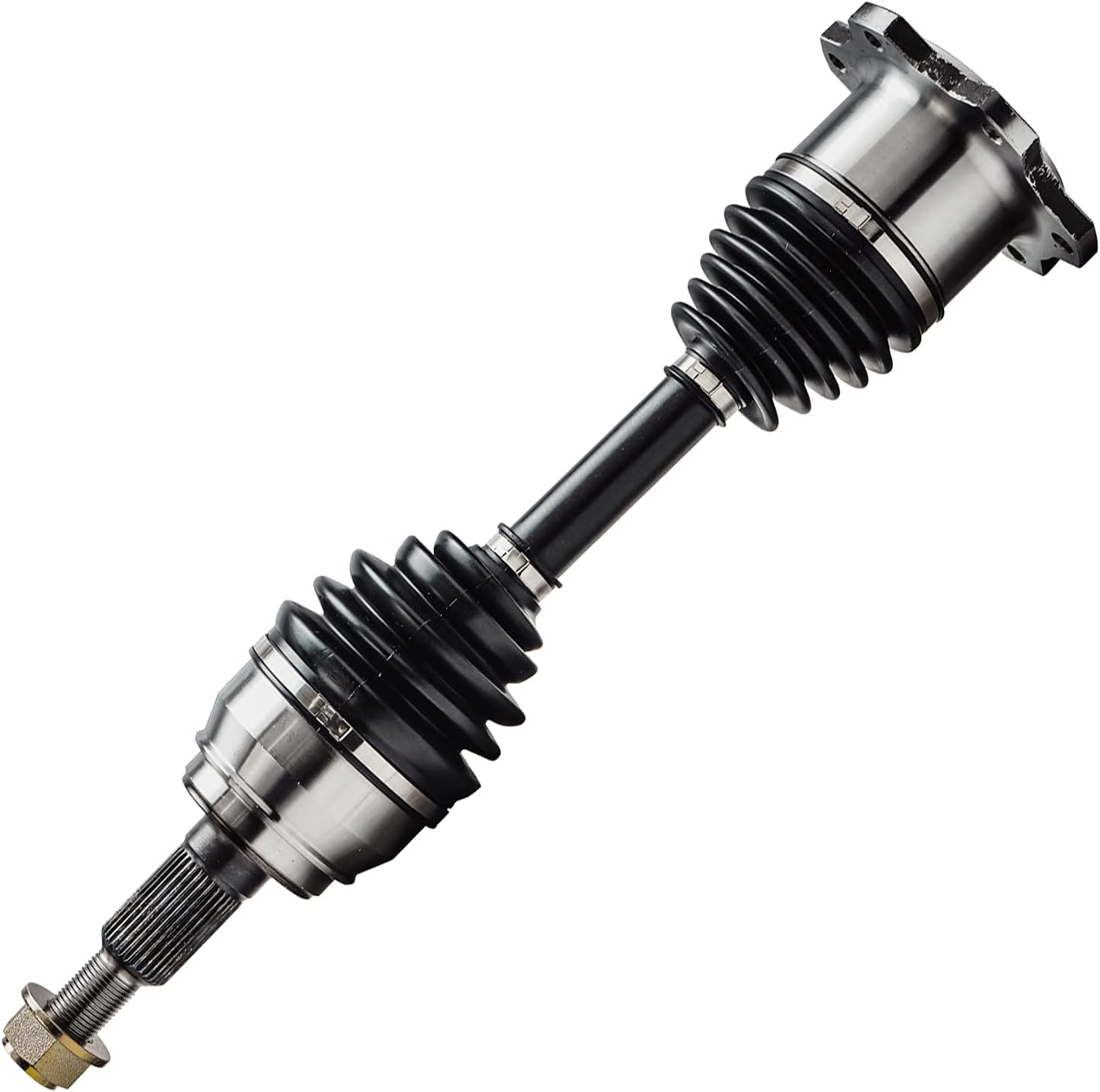
What are the symptoms of a failing CV joint, and how does it relate to the axle?
A CV (constant velocity) joint is an essential component of the axle assembly in many vehicles. When a CV joint starts to fail, it can exhibit several symptoms that indicate potential problems. Here’s a detailed explanation of the symptoms of a failing CV joint and its relationship to the axle:
Symptoms of a Failing CV Joint:
1. Clicking or popping sounds: One of the most common signs of a failing CV joint is a clicking or popping sound when making turns. This noise usually occurs during tight turns and may indicate worn-out or damaged CV joint bearings.
2. Grease leakage: A failing CV joint may leak grease, which can be seen as dark-colored grease splattered around the CV joint or on the inside of the wheel. Grease leakage is typically caused by a cracked or damaged CV joint boot, which allows the lubricating grease to escape and contaminants to enter.
3. Excessive vibration: A worn-out CV joint can cause vibrations, especially during acceleration. The vibrations may be felt in the steering wheel, floorboards, or even the entire vehicle. These vibrations can become more noticeable as the CV joint deteriorates further.
4. Difficulty in turning: As the CV joint wears out, it may become difficult to turn the vehicle, especially at low speeds or when making sharp turns. This symptom is often accompanied by a clicking or popping sound.
5. Uneven tire wear: A failing CV joint can lead to uneven tire wear. If the CV joint is damaged or worn, it can cause the axle to wobble or vibrate, resulting in uneven tire tread wear. This can be observed by visually inspecting the tires and noticing uneven patterns of wear.
Relationship to the Axle:
The CV joint is an integral part of the axle assembly. It connects the transmission to the wheels and allows smooth power delivery to the wheels while accommodating the up-and-down motion of the suspension. The axle shaft is responsible for transmitting torque from the transmission to the CV joints and ultimately to the wheels.
Axles contain one or more CV joints, depending on the vehicle’s drivetrain configuration. In front-wheel drive vehicles, each front axle typically has two CV joints, one inner and one outer. Rear-wheel drive and all-wheel drive vehicles may have CV joints on both the front and rear axles.
The CV joint consists of a joint housing, bearings, and internal ball bearings or rollers. It is protected by a rubber or thermoplastic CV joint boot, which seals in the grease and protects the joint from contaminants. When the CV joint fails, it can affect the axle’s ability to transmit power smoothly and result in the symptoms mentioned above.
Regular inspection and maintenance of the CV joint and axle assembly are crucial to identify and address any issues promptly. If any of the symptoms mentioned earlier are observed, it is recommended to have the vehicle inspected by a qualified mechanic to determine the exact cause and perform necessary repairs or replacements.

What are the signs of a worn or failing axle, and how can I troubleshoot axle issues?
Identifying the signs of a worn or failing axle is important for maintaining the safety and functionality of your vehicle. Here are some common signs to look out for and troubleshooting steps you can take to diagnose potential axle issues:
- Unusual Noises:
- Vibrations:
- Uneven Tire Wear:
- Difficulty Steering:
- Visible Damage or Leaks:
- Professional Inspection:
If you hear clunking, clicking, or grinding noises coming from the area around the wheels, it could indicate a problem with the axle. These noises may occur during acceleration, deceleration, or when turning. Troubleshoot by listening carefully to the location and timing of the noises to help pinpoint the affected axle.
A worn or failing axle can cause vibrations that can be felt through the steering wheel, floorboard, or seat. These vibrations may occur at certain speeds or during specific driving conditions. If you experience unusual vibrations, it’s important to investigate the cause, as it could be related to axle problems.
Inspect your tires for uneven wear patterns. Excessive wear on the inner or outer edges of the tires can be an indication of axle issues. Misaligned or damaged axles can cause the tires to tilt, leading to uneven tire wear. Regularly check your tires for signs of wear and take note of any abnormalities.
A worn or damaged axle can affect steering performance. If you experience difficulty in steering, such as stiffness, looseness, or a feeling of the vehicle pulling to one side, it may be due to axle problems. Pay attention to any changes in steering responsiveness and address them promptly.
Inspect the axles visually for any signs of damage or leaks. Look for cracks, bends, or visible fluid leaks around the axle boots or seals. Damaged or leaking axles can lead to lubrication loss and accelerated wear. If you notice any visible issues, it’s important to have them inspected and repaired by a qualified mechanic.
If you suspect axle issues but are unsure about the exact cause, it’s advisable to seek a professional inspection. A qualified mechanic can perform a thorough examination of the axles, suspension components, and related systems. They have the expertise and tools to diagnose axle problems accurately and recommend the appropriate repairs.
It’s important to note that troubleshooting axle issues can sometimes be challenging, as symptoms may overlap with other mechanical problems. If you’re uncertain about diagnosing or repairing axle issues on your own, it’s recommended to consult a professional mechanic. They can provide a proper diagnosis, ensure the correct repairs are performed, and help maintain the safety and performance of your vehicle.


editor by CX 2024-02-11
China best Front Wheel Bearing Hub Assembly Spare Parts 3307.76 9421003 Fit for Citroen C and P-Eugeot 206 207 208 near me manufacturer
Product Description
Quick view:
| Name | Front wheel hub 3307.76 |
| Material | Steel GCr15, 65Mn, or 55 |
| Application car makes | CITROEN and P-EUGEOT |
| Size | ID: 37 mm OD: 66 mm Height: 68 mm |
| Holes | 4 holes |
| Weight | 1.65 kg |
| Brand | SI, PPB, or customized |
| Packing | Neutral, our brand packing or customized |
| OEM replacement | Yes |
| Manufacture place | ZHangZhoug, China |
| MOQ | 100 PCS |
| Warranty | 1 year or 40,000-50,000 KMS |
| Certificate | ISO9001:2015 |
| Payment | T/T, PayPal, Alibaba |
OEM:
CITROEN/P-EUGEOT: 3307.76
Ref. No.:
OPTIMAL : 04P195
FEBI BILSTEIN : 18285
GSP : 9421003
GSP : GHA421003
Application:
CITROEN C-ELYSEE (DD_) 2012-
CITROEN C2 (JM_) 2003-2012
CITROEN C3 2002-
CITROEN C4 CACTUS 2014-
CITROEN DS3 2571-2015
CITROEN SAXO (S0, S1) 1996-2003
CITROEN XSARA (N1) 1997-2005
P-EUGEOT 1007 (KM_) 2005-
P-EUGEOT 106 II (1A_, 1C_) 1996-2004
P-EUGEOT 2008 I (CU_) 2013-
P-EUGEOT 206 1998-2016
P-EUGEOT 207 2006-2015
P-EUGEOT 208 I (CA_, CC_) 2012-
P-EUGEOT 306 1993-2001
Other types:
| BCA | S-KF | TIMKEN | Car Model |
| 512161 | BR935713 | 512161 | Ford Escort |
| 512162 | BR935712 | 512162 | Ford/Mercury Taurus |
| 512163 | BR930366 | 512163 | Ford/Mercury Taurus |
| 512164 | BR935716 | 512164 | Ford/Mercury Taurus |
| 512167 | BR930173 | 512167 | Chrysler PT Cruiser |
| 512169 | BR935718 | 512169 | Chrysler Town & Country |
| 512170 | BR935719 | 512170 | Chrysler Town & Country |
| 512176 | BR930167 | 512176 | Honda Accord |
| 512178 | BR935716 | 512178 | Honda Accord |
| 512179 | BR930071 | 512179 | Acura |
| 512180 | BR930159 | 512180 | Honda Odyssey |
| 512191 | BR935713 | 512191 | KIA Magentis & Optima |
| 512193 | BR935710 | 512193 | Hyundai Accent |
| 512194 | BR930262 | 512194 | Hyundai Elantra |
| 512195 | BR930260 | 512195 | Hyundai Elantra |
| 512200 | BR930165 | 512200 | KIA Sephia |
| 512201 | BR930362 | 512201 | Nissan Altima |
| 512202 | BR930362 | 512202 | Nissan Altima |
| 512203 | BR930403 | 512203 | Infiniti I30 |
| 512206 | BR930267 | HA592460 | Toyota Camry |
| 512207 | BR930266 | HA592450 | Toyota Camry |
| 512218 | BR930329 | 512218 | Toyota Matrix |
| 512220 | BR930199 | 512220 | Chrysler Cirrus |
| 512229 | BR930327 | 512229 | Chevy Equinox |
| 512230 | BR930328 | 512230 | Chevy Equinox |
| 512237 | BR930075 | 512237 | B-uick Century |
| 512244 | BR930075 | HA590073 | B-uick Allure |
| 512303 | BR93571 | HA590110 | Nissan Sentra |
| 513012 | BR930093 | 513012 | B-uick Skyhawk |
| 513013 | BR930052K | 513013 | B-uick Riviera |
| 513018 | BR930026 | 513018 | B-uick Century |
| 513030 | BR930043 | 513030 | Ford Escort |
| 513033 | BR93571 | 513033 | Acura Integra |
| 513035 | BR930033 | 513035 | Honda Civic |
| 513044 | BR930083K | 513044 | B-uick Regal |
| 513061 | BR930064 | 513061 | Chevy/GMC S15 Jimmy |
| 513062 | BR930068 | 513062 | B-uick Electra |
| 513074 | BR930571K | 513074 | Chrysler Town & Country |
| 513075 | BR930013 | 513075 | Chrysler Le Baron |
| 513077 | BR930003 | 513077 | Ford Thunderbird |
| 513080 | BR930120 | 513080 | Honda Acord Coupe |
| 513081 | BR930124 | 513081 | Honda Acord Coupe |
| 513082 | BR930008 | 513082 | Dodge Caravan |
| 513087 | BR930076 | 513087 | B-uick Park Ave |
| 513088 | BR930077 | 513088 | B-uick LeSabre |
| 513089 | BR930190K | 513089 | Chrysler Concorde |
| 513092 | BR930048 | 513092 | Ford Thunderbird |
| 513098 | FW156 | 513098 | Acura |
| 513100 | BR930179 | 513100 | Ford Taurus |
| 513104 | BR930060 | 513104 | Ford Crown Vic |
| 513105 | BR930113 | 513105 | Acura Integra |
| 513109 | BR930045 | 513109 | Dodge Viper |
| 513115 | BR935710 | 513115 | Ford Mustang |
| 513121 | BR930148 Threaded Hub/BR930548K |
513121 | B-uick Century |
| 513122 | BR935716 | 513122 | Chrysler Town & Country |
| 513123 | BR935715 | 513123 | Chrysler Prowler |
| 513124 | BR930097 | 513124 | Chevy/GMC |
| 513137 | BR930080 | 513137 | Chevy Fleet Classic |
| 513138 | BR930138 | 513138 | Chrysler Cirrus |
| 513156 | BR935716 | 513156 | Ford Windstar |
| 513160 | BR930184 | 513160 | B-uick Century |
| 513179 | BR930149/930548K | 513179 | B-uick Century |
| 513187 | BR930149/930548K | 513187 | B-uick Rendevous |
| 513193 | BR930308 | 513193 | Chevy Tracker |
| 513196 | BR930306 | 513196 | Ford Crown Vic |
| 513202 | BR930168 W/ABS | 513202 | Ford Crown Vic |
| 513203 | BR930184 | HA590076/ HA590085 | B-uick Allure |
| 513204 | BR935716 | HA590068 | Chevy Colbalt |
FAQ:
1. When are you going to deliver?
A: Sample: 5-15 business days after payment is confirmed.
Bulk order:15-60 workdays after deposit received…
2. What’s your delivery way?
A: By sea, by air, by train, express as your need.
3. What are your terms of delivery?
A: EXW, FOB, CFR, CIF, DAP, etc.
4. Can you support the sample order?
A: Yes, we can supply the sample if we have parts in stock, but the customer has to pay the sample payment(according to the value of the samples) and the shipping cost.
5. What are you going to do if there has a claim for the quality or quantity missing?
A: 1. For quality, during the warranty period, if any claim for it, we shall help customer to find out what’s the exactly problem. Using by mistake, installation problem, or poor quality? Once it’s due to the poor quality, we will arrange the new products to customers.
2. For missing quantities, there have 2 weeks for claiming the missing ones after receiving the goods. We shall help to find out where it is.
What is a drive shaft?
If you notice a clicking noise while driving, it is most likely the driveshaft. An experienced auto mechanic will be able to tell you if the noise is coming from both sides or from 1 side. If it only happens on 1 side, you should check it. If you notice noise on both sides, you should contact a mechanic. In either case, a replacement driveshaft should be easy to find.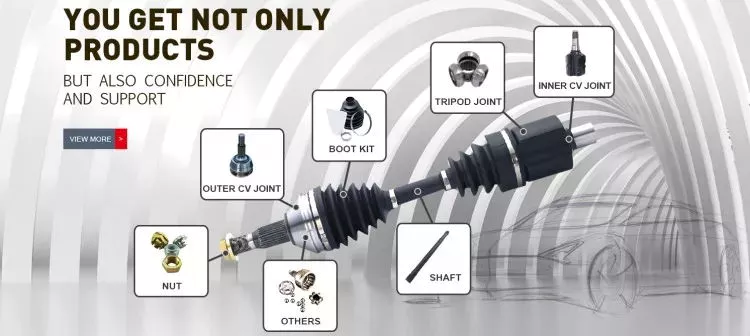
The drive shaft is a mechanical part
A driveshaft is a mechanical device that transmits rotation and torque from the engine to the wheels of the vehicle. This component is essential to the operation of any driveline, as the mechanical power from the engine is transmitted to the PTO (power take-off) shaft, which hydraulically transmits that power to connected equipment. Different drive shafts contain different combinations of joints to compensate for changes in shaft length and angle. Some types of drive shafts include connecting shafts, internal constant velocity joints, and external fixed joints. They also contain anti-lock system rings and torsional dampers to prevent overloading the axle or causing the wheels to lock.
Although driveshafts are relatively light, they need to handle a lot of torque. Torque applied to the drive shaft produces torsional and shear stresses. Because they have to withstand torque, these shafts are designed to be lightweight and have little inertia or weight. Therefore, they usually have a joint, coupling or rod between the 2 parts. Components can also be bent to accommodate changes in the distance between them.
The drive shaft can be made from a variety of materials. The most common material for these components is steel, although alloy steels are often used for high-strength applications. Alloy steel, chromium or vanadium are other materials that can be used. The type of material used depends on the application and size of the component. In many cases, metal driveshafts are the most durable and cheapest option. Plastic shafts are used for light duty applications and have different torque levels than metal shafts.
It transfers power from the engine to the wheels
A car’s powertrain consists of an electric motor, transmission, and differential. Each section performs a specific job. In a rear-wheel drive vehicle, the power generated by the engine is transmitted to the rear tires. This arrangement improves braking and handling. The differential controls how much power each wheel receives. The torque of the engine is transferred to the wheels according to its speed.
The transmission transfers power from the engine to the wheels. It is also called “transgender”. Its job is to ensure power is delivered to the wheels. Electric cars cannot drive themselves and require a gearbox to drive forward. It also controls how much power reaches the wheels at any given moment. The transmission is the last part of the power transmission chain. Despite its many names, the transmission is the most complex component of a car’s powertrain.
The driveshaft is a long steel tube that transmits mechanical power from the transmission to the wheels. Cardan joints connect to the drive shaft and provide flexible pivot points. The differential assembly is mounted on the drive shaft, allowing the wheels to turn at different speeds. The differential allows the wheels to turn at different speeds and is very important when cornering. Axles are also important to the performance of the car.
It has a rubber boot that protects it from dust and moisture
To keep this boot in good condition, you should clean it with cold water and a rag. Never place it in the dryer or in direct sunlight. Heat can deteriorate the rubber and cause it to shrink or crack. To prolong the life of your rubber boots, apply rubber conditioner to them regularly. Indigenous peoples in the Amazon region collect latex sap from the bark of rubber trees. Then they put their feet on the fire to solidify the sap.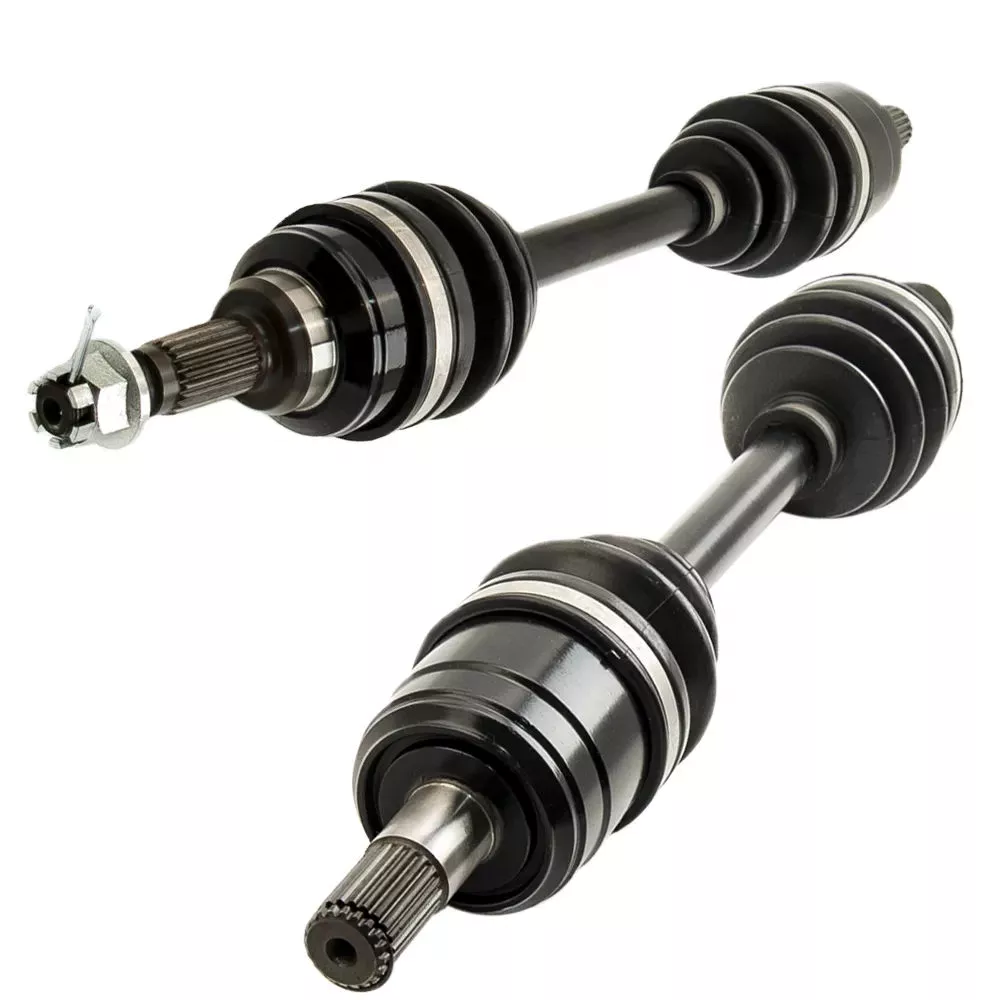
it has a U-shaped connector
The drive shaft has a U-joint that transfers rotational energy from the engine to the axle. Defective gimbal joints can cause vibrations when the vehicle is in motion. This vibration is often mistaken for a wheel balance problem. Wheel balance problems can cause the vehicle to vibrate while driving, while a U-joint failure can cause the vehicle to vibrate when decelerating and accelerating, and stop when the vehicle is stopped.
The drive shaft is connected to the transmission and differential using a U-joint. It allows for small changes in position between the 2 components. This prevents the differential and transmission from remaining perfectly aligned. The U-joint also allows the drive shaft to be connected unconstrained, allowing the vehicle to move. Its main purpose is to transmit electricity. Of all types of elastic couplings, U-joints are the oldest.
Your vehicle’s U-joints should be inspected at least twice a year, and the joints should be greased. When checking the U-joint, you should hear a dull sound when changing gears. A clicking sound indicates insufficient grease in the bearing. If you hear or feel vibrations when shifting gears, you may need to service the bearings to prolong their life.
it has a slide-in tube
The telescopic design is a modern alternative to traditional driveshaft designs. This innovative design is based on an unconventional design philosophy that combines advances in material science and manufacturing processes. Therefore, they are more efficient and lighter than conventional designs. Slide-in tubes are a simple and efficient design solution for any vehicle application. Here are some of its benefits. Read on to learn why this type of shaft is ideal for many applications.
The telescopic drive shaft is an important part of the traditional automobile transmission system. These driveshafts allow linear motion of the 2 components, transmitting torque and rotation throughout the vehicle’s driveline. They also absorb energy if the vehicle collides. Often referred to as foldable driveshafts, their popularity is directly dependent on the evolution of the automotive industry.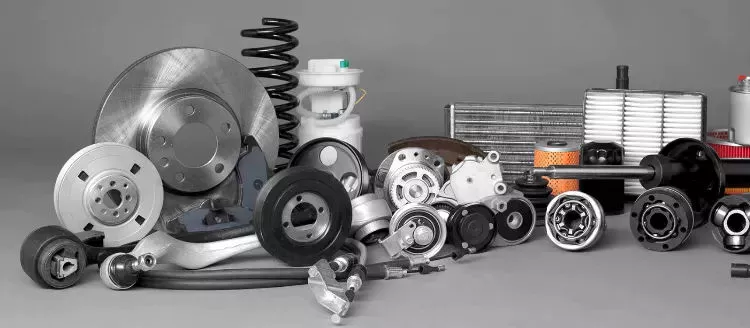
It uses a bearing press to replace worn or damaged U-joints
A bearing press is a device that uses a rotary press mechanism to install or remove worn or damaged U-joints from a drive shaft. With this tool, you can replace worn or damaged U-joints in your car with relative ease. The first step involves placing the drive shaft in the vise. Then, use the 11/16″ socket to press the other cup in far enough to install the clips. If the cups don’t fit, you can use a bearing press to remove them and repeat the process. After removing the U-joint, use a grease nipple Make sure the new grease nipple is installed correctly.
Worn or damaged U-joints are a major source of driveshaft failure. If 1 of them were damaged or damaged, the entire driveshaft could dislocate and the car would lose power. Unless you have a professional mechanic doing the repairs, you will have to replace the entire driveshaft. Fortunately, there are many ways to do this yourself.
If any of these warning signs appear on your vehicle, you should consider replacing the damaged or worn U-joint. Common symptoms of damaged U-joints include rattling or periodic squeaking when moving, rattling when shifting, wobbling when turning, or rusted oil seals. If you notice any of these symptoms, take your vehicle to a qualified mechanic for a full inspection. Neglecting to replace a worn or damaged u-joint on the driveshaft can result in expensive and dangerous repairs and can cause significant damage to your vehicle.


China manufacturer 140*180*5mm AXK140180 High Limiting Speed Needle Roller Thrust Bearing Used In Automobile Drive Trains with Good quality
Product Description
140*180*5mm AXK140180 High Limiting Speed Needle Roller Thrust Bearing Used In Automobile
Drive Trains
Application
Machine Tools Cars and Light Trucks
Trucks, Trailers and Buses Two and Three Wheelers
Needle roller thrust bearings are fitted with a form-stable cage to reliably retain and CZPT a large number of needle rollers.
Needle roller thrust bearings provide a high degree of stiffness within a minimum axial space.
In applications where the faces of adjacent machine components can serve as raceways, needle roller thrust bearings take up
no more space than a conventional thrust washer.
Needle Roller Thrust Bearings with Washers Specification
| Product Name | Needle Roller Thrust Bearings with Washers |
| Shaft Diameter | Available for 10 ≤ d ≤ 50 mm |
| Material | Bearing Steel (GCr15) |
| Suitable Washers | LS, AS, GS 811 or WS 811 series |
| Cage | Steel |
| Features | Accommodate heavy axial loads and CZPT loads |
| Certification | ISO 9001:2008 |
| Packing | 1.Neutral Packing Bearing 2.Industrial Packing 3.Commercial Packing Bearing 4.Customize |
| Delivery Time | 30 – 45 Days After The Order is Confirmed |
| Shippment | 1.By Sea 2.By Air 3.By Express |
| Website | http://hlimachinery |
| Model | Thrust Washer | Boundary Dimensions (mm) | Basic Load Rating (KN) | Limited | Mass | |||||||||
| Speed | ||||||||||||||
| d | D | Dw | B1 | B | a | Eb | Ea | C | Co | rpm | kg | |||
| AXK571TN | AS571 | 4 | 14 | 2 | 1 | 5 | 13 | 3.52 | 6.4 | 16800 | 0.001 | |||
| AXK571TN | AS571 | 5 | 15 | 2 | 1 | 6 | 14 | 3.8 | 7.36 | 16800 | 0.001 | |||
| AXK0619TN | AS0619 | LS0619 | 6 | 19 | 2 | 1 | 2.75 | 0.3 | 7 | 18 | 5.44 | 12.4 | 15200 | 0.004 |
| AXK0821TN | AS0821 | LS0821 | 8 | 21 | 2 | 1 | 2.75 | 0.3 | 9 | 20 | 6.24 | 15.52 | 14400 | 0.004 |
| AXK1571 | AS1571 | LS1571 | 10 | 24 | 2 | 1 | 2.75 | 0.3 | 12 | 23 | 7.36 | 20.4 | 13600 | 0.007 |
| AXK1226 | AS1226 | LS1226 | 12 | 26 | 2 | 1 | 2.75 | 0.3 | 14 | 25 | 7.92 | 23.2 | 12000 | 0.008 |
| AXK1528 | AS1528 | LS1528 | 15 | 28 | 2 | 1 | 2.75 | 0.3 | 17 | 27 | 9.04 | 28.8 | 10400 | 0.009 |
| AXK1730 | AS1730 | LS1730 | 17 | 30 | 2 | 1 | 2.75 | 0.3 | 19 | 29 | 9.52 | 31.6 | 9600 | 0.009 |
| AXK2035 | AS2035 | LS2035 | 20 | 35 | 2 | 1 | 2.75 | 0.3 | 22 | 34 | 10.48 | 37.2 | 8000 | 0.013 |
| AXK2542 | AS2542 | LS2542 | 25 | 42 | 2 | 1 | 3 | 0.6 | 29 | 41 | 11.76 | 46.4 | 6800 | 0.019 |
| AXK3047 | AS3047 | LS3047 | 30 | 47 | 2 | 1 | 3 | 0.6 | 34 | 46 | 13.04 | 56 | 6000 | 0.571 |
| AXK3552 | AS3552 | LS3552 | 35 | 52 | 2 | 1 | 3.5 | 0.6 | 39 | 51 | 14.24 | 64.8 | 5200 | 0.571 |
| AXK4060 | AS4060 | LS4060 | 40 | 60 | 3 | 1 | 3.5 | 0.6 | 45 | 58 | 22.4 | 91.2 | 4800 | 0.04 |
| AXK4565 | AS4565 | LS4565 | 45 | 65 | 3 | 1 | 4 | 0.6 | 50 | 63 | 24 | 102.4 | 4000 | 0.05 |
| AXK5070 | AS5070 | LS5070 | 50 | 70 | 3 | 1 | 4 | 0.6 | 55 | 68 | 25.6 | 114.4 | 3840 | 0.055 |
| AXK5578 | AS5578 | LS5578 | 55 | 78 | 3 | 1 | 5 | 0.6 | 60 | 76 | 30.4 | 148.8 | 3440 | 0.088 |
| AXK6085 | AS6085 | LS6085 | 60 | 85 | 3 | 1 | 4.75 | 1 | 65 | 83 | 35.6 | 187.2 | 3200 | 0.097 |
| AXK6590 | AS6590 | LS6590 | 65 | 90 | 3 | 1 | 5.25 | 1 | 70 | 88 | 37.2 | 204 | 2960 | 0.115 |
| AXK7095 | AS7095 | LS7095 | 70 | 95 | 4 | 1 | 5.25 | 1 | 74 | 93 | 43.2 | 204 | 2800 | 0.123 |
| AXK75100 | AS75100 | LS75100 | 75 | 100 | 4 | 1 | 5.75 | 1 | 79 | 98 | 44 | 212 | 2640 | 0.142 |
| AXK85715 | AS85715 | LS85715 | 80 | 105 | 4 | 1 | 5.75 | 1 | 84 | 103 | 44.8 | 224 | 2480 | 0.151 |
| AXK85110 | AS85110 | LS85110 | 85 | 110 | 4 | 1 | 5.75 | 1 | 89 | 108 | 46.4 | 232 | 2400 | 0.159 |
| AXK90120 | AS90120 | LS90120 | 90 | 120 | 4 | 1 | 6.5 | 1 | 94 | 118 | 58.4 | 324 | 2160 | 0.234 |
| AXK100135 | AS100135 | LS100135 | 100 | 135 | 4 | 1 | 7 | 1 | 105 | 133 | 72.8 | 448 | 2000 | 0.35 |
| AXK110145 | AS110145 | LS110145 | 110 | 145 | 4 | 1 | 7 | 1 | 115 | 143 | 77.6 | 496 | 1840 | 0.385 |
| AXK120155 | AS120155 | LS120155 | 120 | 155 | 4 | 1 | 7 | 1 | 125 | 153 | 81.6 | 544 | 1680 | 0.415 |
| AXK130170 | AS130170 | LS130170 | 130 | 170 | 5 | 1 | 9 | 1 | 136 | 167 | 106.4 | 672 | 1520 | 0.663 |
| AXK140180 | AS140180 | LS140180 | 140 | 180 | 5 | 1 | 9.5 | 1 | 146 | 177 | 110.4 | 720 | 1440 | 0.749 |
| AXK150190 | AS150190 | LS150190 | 150 | 190 | 5 | 1 | 9.5 | 1 | 156 | 187 | 114.4 | 768 | 1360 | 0.796 |
| AXK165710 | AS165710 | LS165710 | 160 | 200 | 5 | 1 | 9.5 | 1 | 166 | 197 | 118.4 | 816 | 1280 | 0.842 |
About Us
HENGLI Machinery Company is a well-established Chinese bearing supplier. We design, manufacture and wholesale bearings.
Our specialized manufacturer of Spherical Roller Bearing & Cylindrical Roller Bearing, XIHU (WEST LAKE) DIS. Rolling Bearing Co., Ltd was
established in 1970 and is accredited by the Chinese Ministry of Machine Building.
We invested in 2 additional specialized bearing factories, which allow us to provide our clients with top of the line products such as
Needle Roller Bearings, Cam Follower Bearings, Thrust Bearing, Rod Ends Bearings, Ball Joint Bearings, Tapered Roller
Bearings, Wheel Hub Bearings and Non-Standard Bearings.
FAQ
Q1 – What is our advantages?
A – Manufacturer – Do it only with the Best;
-Your Choice make different.
Q2 – Our Products
A – Spherical Roller Bearing, Cylindrical Roller Bearing, Needle Roller Bearing, Cam Followers, Thrust Bearing
– Spherical Plain Bearing, Rod End, Ball Joint, Wheel Hub, Tapered Roller Bearing
Q3 – Process of our production
A – Heat Treatment – Grinding – Parts Inspection – Assembly – Final Inspection – Packing
Q4 – How to customize bearing(non-standard) from your company?
A -We offer OEM,Customized(Non-standard) service and you need to provide drawing and detailed Technical Data.
Q5 – What should I care before installation?
A – Normally, the preservative with which new bearings are coated before leaving the factory does not need to be
removed; it is only necessary to wipe off the outside cylindrical surface and bore, if the grease is not compatible
with the preservative, it is necessary to wash and carefully dry the bearing.
-Bearings should be installed in a dry, dust-free room away from metal working or other machines producing
swarf and dust.
Q6 – How to stock and maintenance my bearings right?
A – Do not store bearings directly on concrete floors, where water can condense and collect on the bearing;
-Store the bearings on a pallet or shelf, in an area where the bearings will not be subjected to high humidity
or sudden and severe temperature changes that may result in condensation forming;
-Always put oiled paper or, if not available, plastic sheets between rollers and cup races of tapered roller bearings.
How to Replace the Drive Shaft
Several different functions in a vehicle are critical to its functioning, but the driveshaft is probably the part that needs to be understood the most. A damaged or damaged driveshaft can damage many other auto parts. This article will explain how this component works and some of the signs that it may need repair. This article is for the average person who wants to fix their car on their own but may not be familiar with mechanical repairs or even driveshaft mechanics. You can click the link below for more information.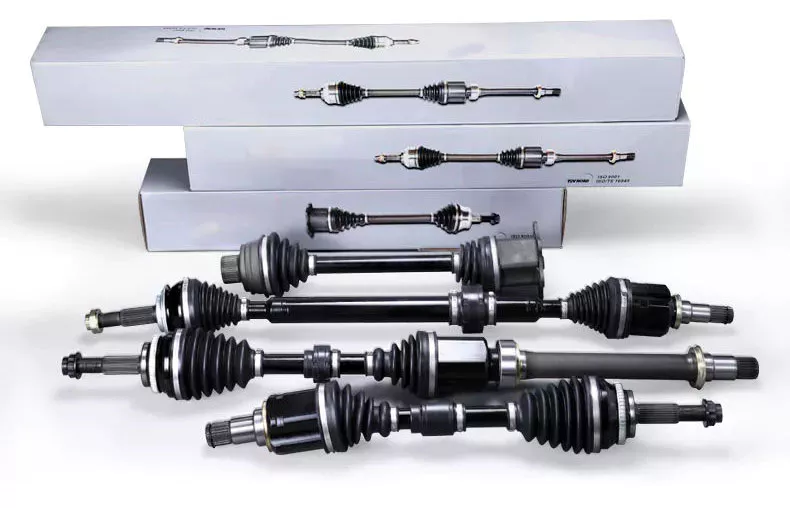
Repair damaged driveshafts
If you own a car, you should know that the driveshaft is an integral part of the vehicle’s driveline. They ensure efficient transmission of power from the engine to the wheels and drive. However, if your driveshaft is damaged or cracked, your vehicle will not function properly. To keep your car safe and running at peak efficiency, you should have it repaired as soon as possible. Here are some simple steps to replace the drive shaft.
First, diagnose the cause of the drive shaft damage. If your car is making unusual noises, the driveshaft may be damaged. This is because worn bushings and bearings support the drive shaft. Therefore, the rotation of the drive shaft is affected. The noise will be squeaks, dings or rattles. Once the problem has been diagnosed, it is time to repair the damaged drive shaft.
Professionals can repair your driveshaft at relatively low cost. Costs vary depending on the type of drive shaft and its condition. Axle repairs can range from $300 to $1,000. Labor is usually only around $200. A simple repair can cost between $150 and $1700. You’ll save hundreds of dollars if you’re able to fix the problem yourself. You may need to spend a few more hours educating yourself about the problem before handing it over to a professional for proper diagnosis and repair.
The cost of repairing a damaged driveshaft varies by model and manufacturer. It can cost as much as $2,000 depending on parts and labor. While labor costs can vary, parts and labor are typically around $70. On average, a damaged driveshaft repair costs between $400 and $600. However, these parts can be more expensive than that. If you don’t want to spend money on unnecessarily expensive repairs, you may need to pay a little more.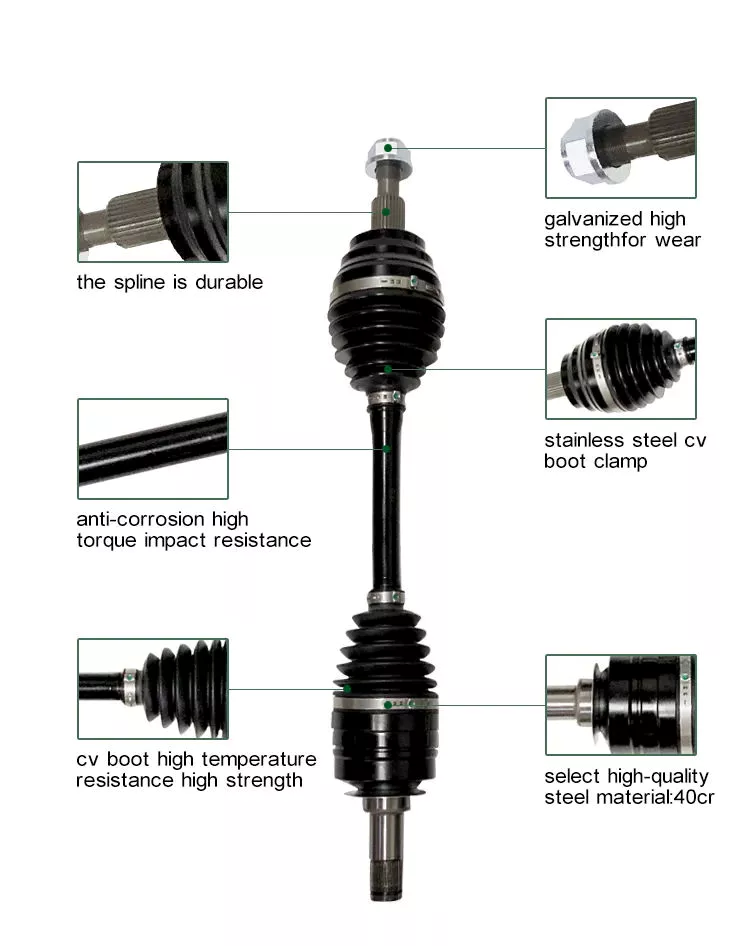
Learn how drive shafts work
While a car engine may be 1 of the most complex components in your vehicle, the driveshaft has an equally important job. The driveshaft transmits the power of the engine to the wheels, turning the wheels and making the vehicle move. Driveshaft torque refers to the force associated with rotational motion. Drive shafts must be able to withstand extreme conditions or they may break. Driveshafts are not designed to bend, so understanding how they work is critical to the proper functioning of the vehicle.
The drive shaft includes many components. The CV connector is 1 of them. This is the last stop before the wheels spin. CV joints are also known as “doughnut” joints. The CV joint helps balance the load on the driveshaft, the final stop between the engine and the final drive assembly. Finally, the axle is a single rotating shaft that transmits power from the final drive assembly to the wheels.
Different types of drive shafts have different numbers of joints. They transmit torque from the engine to the wheels and must accommodate differences in length and angle. The drive shaft of a front-wheel drive vehicle usually includes a connecting shaft, an inner constant velocity joint and an outer fixed joint. They also have anti-lock system rings and torsional dampers to help them run smoothly. This guide will help you understand the basics of driveshafts and keep your car in good shape.
The CV joint is the heart of the driveshaft, it enables the wheels of the car to move at a constant speed. The connector also helps transmit power efficiently. You can learn more about CV joint driveshafts by looking at the top 3 driveshaft questions
The U-joint on the intermediate shaft may be worn or damaged. Small deviations in these joints can cause slight vibrations and wobble. Over time, these vibrations can wear out drivetrain components, including U-joints and differential seals. Additional wear on the center support bearing is also expected. If your driveshaft is leaking oil, the next step is to check your transmission.
The drive shaft is an important part of the car. They transmit power from the engine to the transmission. They also connect the axles and CV joints. When these components are in good condition, they transmit power to the wheels. If you find them loose or stuck, it can cause the vehicle to bounce. To ensure proper torque transfer, your car needs to stay on the road. While rough roads are normal, bumps and bumps are common.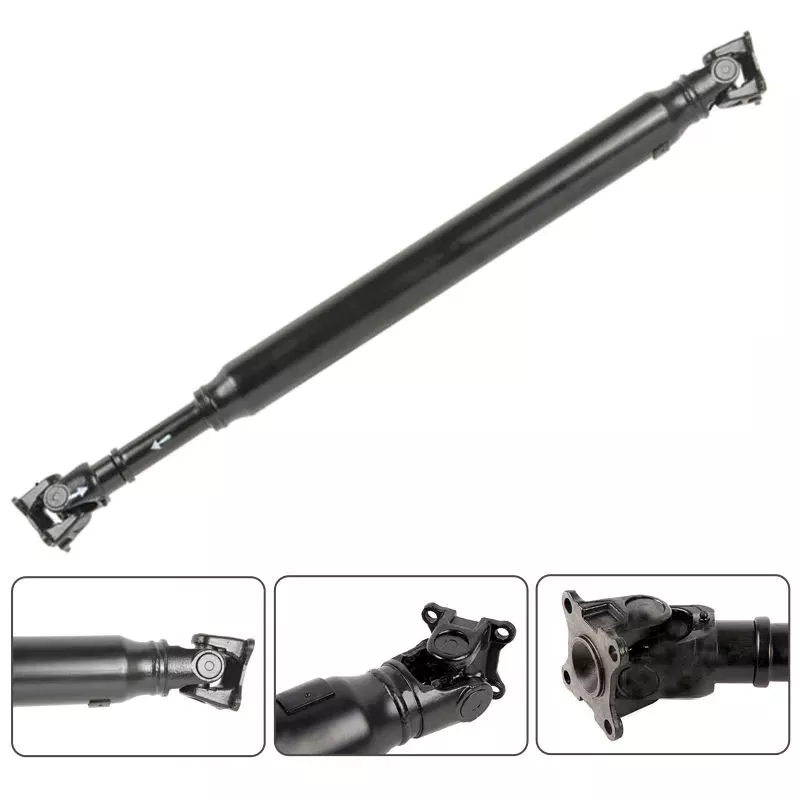
Common signs of damaged driveshafts
If your vehicle vibrates heavily underneath, you may be dealing with a faulty propshaft. This issue limits your overall control of the vehicle and cannot be ignored. If you hear this noise frequently, the problem may be the cause and should be diagnosed as soon as possible. Here are some common symptoms of a damaged driveshaft. If you experience this noise while driving, you should have your vehicle inspected by a mechanic.
A clanging sound can also be 1 of the signs of a damaged driveshaft. A ding may be a sign of a faulty U-joint or center bearing. This can also be a symptom of worn center bearings. To keep your vehicle safe and functioning properly, it is best to have your driveshaft inspected by a certified mechanic. This can prevent serious damage to your car.
A worn drive shaft can cause difficulty turning, which can be a major safety issue. Fortunately, there are many ways to tell if your driveshaft needs service. The first thing you can do is check the u-joint itself. If it moves too much or too little in any direction, it probably means your driveshaft is faulty. Also, rust on the bearing cap seals may indicate a faulty drive shaft.
The next time your car rattles, it might be time for a mechanic to check it out. Whether your vehicle has a manual or automatic transmission, the driveshaft plays an important role in your vehicle’s performance. When 1 or both driveshafts fail, it can make the vehicle unsafe or impossible to drive. Therefore, you should have your car inspected by a mechanic as soon as possible to prevent further problems.
Your vehicle should also be regularly lubricated with grease and chain to prevent corrosion. This will prevent grease from escaping and causing dirt and grease to build up. Another common sign is a dirty driveshaft. Make sure your phone is free of debris and in good condition. Finally, make sure the driveshaft chain and cover are in place. In most cases, if you notice any of these common symptoms, your vehicle’s driveshaft should be replaced.
Other signs of a damaged driveshaft include uneven wheel rotation, difficulty turning the car, and increased drag when trying to turn. A worn U-joint also inhibits the ability of the steering wheel to turn, making it more difficult to turn. Another sign of a faulty driveshaft is the shuddering noise the car makes when accelerating. Vehicles with damaged driveshafts should be inspected as soon as possible to avoid costly repairs.

